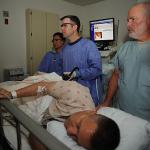Doctors made house calls in the days when they had a small range of medications and therapies to offer and didn’t have immediate access to X-rays or ultrasounds.
Disease
Perhaps you’ve seen Hoarders on cable TV and joined in as viewers experienced the trauma of hoarders giving up their possessions.
Hardly a day passes without a report of some new, startling application of Artificial Intelligence.
These authors, from the University of Michigan, concluded that their study provided:
The current study, reported in Cell Systems, uses a unique method to try and untangle the ISR’s response.
Let’s begin with a quick definition, a nature prescription is a recommendation to a patient to “spend a fixed amount of time a week in a natural setting, such as a park.” It is most frequently an adjunctive treatment, perhaps like “you need to los
It is no secret that modern high-sugar diets have systematically harmed humans’ dental health. Around a third of the global population suffer from tooth decay, despite the availability of effective, low-cost measures to prevent it.
Alzheimer's drugs, at least the experimental ones, are a dime a dozen. Maybe less.












